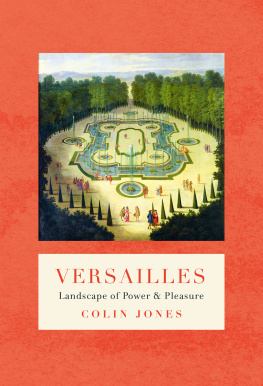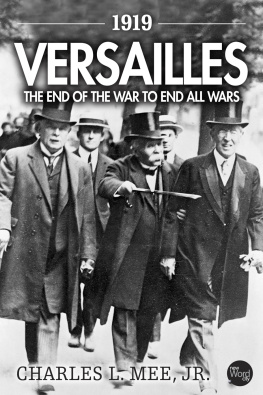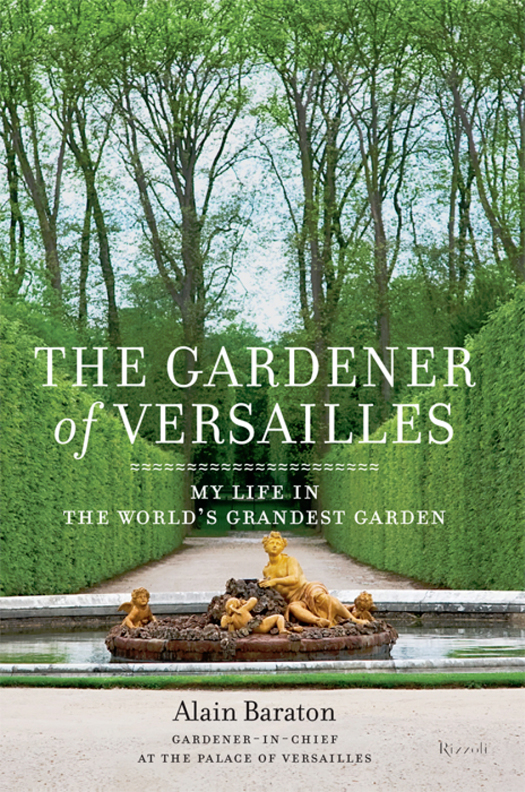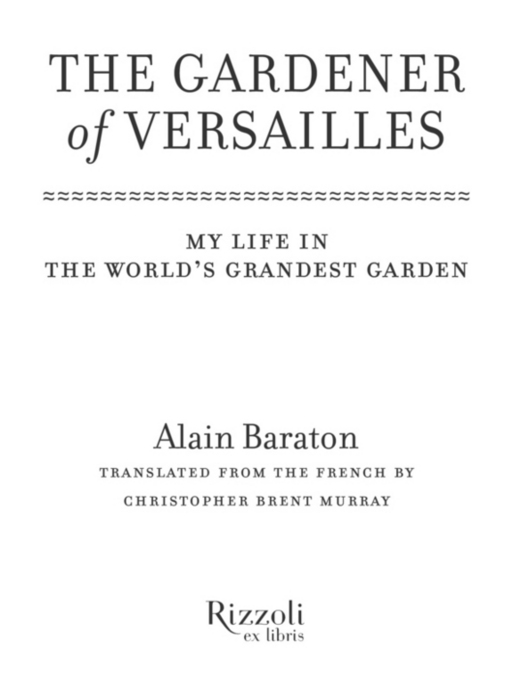[Baratons book] is a garden full of secrets, ripe for discovery.
Le Quotidien
Everything youve ever wanted to know about Versailles isnt found in the official guides. Here is a telling that is fully inside, and even more charming.
Valeurs Actuelles
First published in hardcover in the United States of America in 2014 by Rizzoli Ex Libris, an imprint of Rizzoli International Publications, Inc.
300 Park Avenue South
New York, NY 10010
www.rizzoliusa.com
Originally published in France as Le Jardinier de Versailles
Copyright Editions Grasset & Fasquelle, 2006
Translation Copyright 2014 Christopher Brent Murray
This ebook edition 2014 Editions Grasset & Fasquelle, 2006
All rights reserved. No part of this publication may be reproduced, stored in a retrieval system, or transmitted in any form or by any means, electronic, mechanical, photocopying, recording, or otherwise, without prior consent of the publishers.
ISBN-13: 978-0-8478-4270-4
eBook ISBN: 978-0-8478-4270-4
v3.1
I SLEEP LIKE a log, which is fitting for a gardener. Although I rarely suffer from insomnia (one of the privileges of my profession), the storm of December 26, 1999, was a remarkable exception. I woke up for the first time at around four in the morning. Although groggy, I could feel the walls vibrating and hear the wind whistling through the window frames. It was like being on a sailboatthe whole world seemed to split apart, to pitch, crack, and howl. I grumbled to myself that the palace wasnt going to sink and imagined the Atlantic whipped to a fury at my vacation home, on the island of Olron. The thought calmed me back to sleep until around six, when sleeping had become impossible. The persistent noise that had been infiltrating my dreams finally woke me for good.
The Rgie du Trianon, tucked in the depths of Versailless woods, felt as though it was suspended in a state of vertigo, while outside, the whistling had given way to a low, hostile roar. I got up, but the roar was so loud that it seemed as though I was moving in silence. I had turned on the bedside lamp, walked across creaking floorboards, opening and closing doors as I went, but my actions had been put on mute, drowned out by the infernal waltz of crashing and banging outside.
I went upstairs. The room seemed to moan and struggle, caught in a battle I could never hope to influence. The individual windowpanes looked as fragile as soap bubbles. I approached but didnt dare put my face to the glass, for fear it might suddenly shatter. My thoughts turned to Marie Antoinettes oak tree, in all of its three hundred years of glory, and how it must be suffering. Then my thoughts were interrupted.
I saw trees falling, one after another, effortlessly thrown to the ground by the winds frenzy. At first, I couldnt believe my eyes. How could these giants topple? They had already withstood so much; werent they immortal? The strange, unreal feeling was bolstered by the fact that I couldnt hear the trees fall. Too fast, somewhat jerky, and comicalit was like watching a silent movieto the point that I had trouble taking the scene seriously. But I knew the tumult of the wind masked the sound of the crashes. I knew there was nothing I could do, so I watched, fascinated, as dawn rose over Versailles.
At about seven, I tried to go outside with Pym, my German shepherd, but the wind was blowing so hard that it was nearly impossible to walk, even with my back against the wall, and I could hardly keep my eyes open. The phone and electricity had gone out, of course. I wanted nothing more than to take action and be of use but there was nothing to be done. I went to my office, remembering the fax that had come in the previous night warning about the approaching storm. It had been as useful then as I felt now.
The view from my office windows was terrifying. In the faint morning light, the storm had revealed the roofs of the town beyond, usually hidden behind a mass of trees. They had all been blown down. We had lost about 1,800 trees in the previous big storm of 1990. The damage was colossal, but it had allowed us to start restoring the areas of the park that had started showing their age. What I saw on that morning in December 1999 could not be described as mere damage. The park I had long loved, the park to which I owed my identity, was now dead.
Once the wind had died down, I pulled on my coat in a state of anxiety, afraid of what I would find. I felt like Id just received a phone call bearing bad news. I wasnt alone at Versailles, but the trauma felt personal. Both restless and resigned, I tried to reason with myself: everything pointed to the worst. I braced myself and opened the door.
Outside, the air felt strangely soft and warm, but a veritable battlefield lay before me. The landscape had been upended. The bosquets, ordinarily dense and bushy, were now bare. Treetops lay on the ground. The once-geometric forms of clipped boxwood had been blown into disheveled furies.
Two young beech trees I had recently planted had been among the first to go. They were now smothered under the mass of a fallen cherry tree. My trees, once so orderly and upright, were now tangled and piled up on one another in painful chaos. They lay in agony, their roots naked and suffering, exposed to the air in a position I couldnt help but find shocking. The laws of nature, which usually seemed so clement and productive, had been swept away in a climactic upheaval that had lasted only a few hours. Another revolution had struck the subjects of Versailles, and those subjects (as we often refer to individual trees in French) were going to die. They had been taken away in the space of a night and there was nothing I could do about it. Deprived of the gardens protection, the palace itself suddenly seemed fragile.
Heart racing, I headed to Versailless botanical treasure chest, the Queens Hamlet. The surroundings had changed so dramatically that I had trouble finding my way. Nothing familiar had survived. The trees that once guided visitors through the garden were unrecognizable. Some of them lay on the ground; others had been displaced or crushed by their neighbors. Even the road was gone. In its place lay a field of mud where my boots sank to the calf. I picked through the chaos as best I could, but it was difficult going without any familiar landmarks. Here and there, twisted signs pointed absurdly to Napoleons Pine or The Queens Alle. The kings, queens, and emperors had long disappeared from Versailles, and now the alles were gone as well. Though a few survivors remained standing, my thoughts remained riveted on Marie Antoinettes garden. Had Jussieus cedar survived? It might haveafter all, it had weathered the storm of 1990. What about the massive tulip tree? I didnt dare to even think of it. If only I could start running and calm the thoughts rushing through my head. If only I could dissolve into thin air and rematerialize directly at the entrance to the Hamlet and know what had happened! The mud and branches that had replaced the formerly beautiful alle slowed me down and I cursed the fallen trees barring the route, insulting the park I had once cherished. I had to blaze a trail and find out what had happened.












